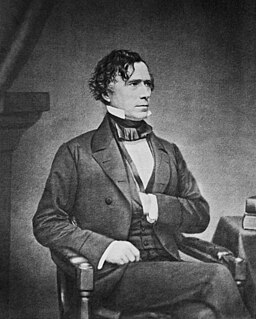📖 Presidential Profile
Comprehensive overview of leadership, policies, and historical significance
📋 Biography & Political Journey
Early Life and Political Ascent
Franklin Pierce was born on November 23, 1804, in Hillsborough, New Hampshire, to Benjamin Pierce, a Revolutionary War veteran and governor of New Hampshire, and Anna Kendrick Pierce. He graduated from Bowdoin College in 1824, where he befriended future author Nathaniel Hawthorne, who would later write Pierce’s campaign biography. After studying law, Pierce was admitted to the bar in 1827 and quickly entered politics as a Jacksonian Democrat, serving in the New Hampshire House of Representatives (1829-1833) and as Speaker from 1831-1833.
Pierce’s rapid political rise continued with his election to the U.S. House of Representatives in 1833 at age 29, making him the youngest member of Congress at the time. He served in the Senate from 1837 to 1842, where he was a reliable Democratic vote supporting President Andrew Jackson’s policies. Pierce resigned from the Senate partly due to his wife Jane’s dislike of Washington and his own struggles with alcohol. He served as a brigadier general in the Mexican-American War, though his military service was marred by fainting episodes during battle, earning him unfair criticism as a coward.
Pierce emerged as the Democratic presidential nominee in 1852 as a compromise candidate on the 49th ballot, chosen because he had made few enemies and supported the Compromise of 1850. His campaign promised to honor the Compromise and avoid reopening sectional disputes over slavery. Running against Whig candidate Winfield Scott, Pierce won decisively with 254 electoral votes to 42, carrying all but four states. His victory represented the last time a Northern Democrat would win the presidency before the Civil War.
The Kansas-Nebraska Catastrophe
Pierce’s presidency was dominated by his disastrous support for the Kansas-Nebraska Act of 1854, which repealed the Missouri Compromise and allowed popular sovereignty to determine slavery in Kansas and Nebraska territories. This legislation, championed by Senator Stephen Douglas, was intended to facilitate railroad construction but instead reopened the national slavery debate with devastating consequences. Pierce actively lobbied for the bill’s passage, believing it would settle the slavery question democratically, but instead it led to “Bleeding Kansas” as pro-slavery and anti-slavery settlers fought violently for control. The violence in Kansas, including the sacking of Lawrence and John Brown’s Pottawatomie Creek Massacre, made Pierce appear weak and ineffective. His recognition of the pro-slavery Lecompton government in Kansas, despite evidence of fraud, further damaged his reputation and contributed to the collapse of the Whig Party and the rise of the Republican Party, making civil war more likely rather than less.
The Curse of the White House Carriage
Pierce’s presidency was overshadowed by a series of tragic accidents that led some to believe the family was cursed. Just two months before his inauguration, Pierce witnessed the horrific death of his 11-year-old son Benjamin in a train derailment near Andover, Massachusetts. The boy was crushed before his parents’ eyes, and his wife Jane never recovered from the trauma, believing God had taken their son as punishment for Pierce’s political ambitions. This tragedy was compounded by equally bizarre incidents during his presidency, including a runaway White House carriage that threw Pierce from his seat, injuring his knee so severely he had to use crutches for weeks. “It seems the very carriages conspire against me,” Pierce reportedly lamented after another incident where his horse bolted during a ceremonial ride, dragging the president through downtown Washington while horrified onlookers watched. These mishaps, combined with his family tragedies, led to whispers that Pierce was jinxed, and his own melancholy demeanor did little to dispel such superstitions.
Humor & Jokes
Pierce's Military Service
Pierce served in the Mexican-American War but fainted during battle. Military heroism wasn't his strongest…
Read More →Greatest Wins
🚢 Opening U.S.-Japan Trade Relations: The Perry Expedition Results
Pierce's administration successfully negotiated the first commercial treaty with Japan, ending centuries of isolation and…
Read More →Epic Fails
🏴☠️ Support for William Walker's Filibustering in Nicaragua
Pierce controversially recognized Walker's illegal takeover of Nicaragua, undermining Central American sovereignty and international law.
Read More →